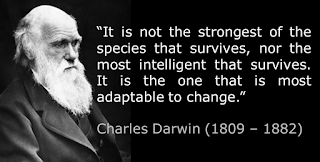Logic, Science
|
"Science is a way of thinking."
Carl Sagan
Carl Sagan
Then logically, the more precise the thinking, the more accurate the science
Survival of the Fittest
Logically, I have issues with this phrase. It's good as short-hand or a sound bite. The thing is, it may not be meeting all the nitty-gritty criteria and conditions for good science. First, survival of the fittest, aren't Darwin's original words. It was coined by Herbert Spencer as a public short-hand or "sound bite" after reading Darwin's theory. This term strongly suggests natural selection, yet as Spencer extended evolution into realms of sociology and ethics, he also made use of Lamarckism. I just want to point out that it is not Darwin's theory itself, nor Darwin's words. As logical as it may be, it is fuzzy science. it misrepresents Darwin's theory. It should go away. Here's why.
It is a tautology. Not that there's anything wrong with that.. as Seinfeld would say. Some tautology is useful especially when dealing with any system of complex interactions. Scientists use them all the time. This is true for science as well as economics. Tautologies are good for identifying all possible cases, organizing them and classifying them.
Tautologies are often fantastic 20/20 hindsight. This kind of logical argument is a circular argument based on an premise that can't be falsified, (the invisible hand did it). Survival of the fittest as worded, does not readily allow isolating a variable and verifying that there are no confounding variables. In nature, stochastic events and confounding variables abound. Now there is next to no predictive theoretical contribution left in it. I think basing future knowledge and action on this is hazardous. It is missing the visible human hand of science and distorting an understanding of what a theory really is for use as policy.
The real damage of this tautology is that it has been used as a logical model beyond biology and with regrettable results. Tautologies are a form of logic. Also from the root logos or word, it has nuanced characteristics. Differences in the meaning of words can be important to a clearer insight. My apologies to the pure rationalists but although logic looks at all possibilities its has practical limits too. Logic or deductive reasoning can make a valid construct, the field of all rational possibilities. But unbounded and untested information is of little value. Without proof of the particulars, tested, repeatable and falsifiable, in other words the application of a hands-on science, it should have limited use.
A simple example is generated in statistics by plotting numbers and their inverses. Possible fields are the only things it describes and logic allows only one combination of pairs. It forms a 2 dimensional line and a 2 dimensional insight. Deductions from this are almost trivial. With more complexity, more problems.
In even simpler terms, averages aren't great either. With your head in a furnace and your feet in liquid nitrogen, statistically... on average, you're perfectly ok. Something obvious is missing. See what I mean? With statistics, you have to be very clear not only what you are measuring but why and how.
|
Scientific Thinking
Logic
allows for covering all the possibilities.
Science
narrows down the search in the mountain of information to the more probable choices.
Theories
further isolate the research to the most likely or best fit and they offer predictive value.
Mathematical models are logical definitions with numbers and so prone to tautological entanglements as well. Examples of tautologies and self-correlations abound in science, business and beyond.
As a vague tautology, survival of the fittest, is scientifically unfit.
Maladapted, it may be (over) due for extinction.
Thinking Tools
These are helpful tools for evaluating scientific theories
|
| Lies, Damn Lies and Statistics In statistics, the Greek letter sigma is only an estimate and not the actual parameter. It singles out what we measure. We should not lose sight of that. By the way, coincidentally the true parameter estimated by the statistical sample is called by the Greek letter MU.
In order to see their implications, more elaborate investigation is needed when dealing with more complex tautologies. This applies to all kinds of equations, including logistic ones. But what is different is they are not really worded right for a hypothesis. Hypotheses can be empirically validated or not. It asks if the observed conclusions can be proven false. And not just from anecdotal evidence.
In evolutionary science the difficulty arises in defining fitness. Mathematically the details are a niche that is a mutli-dimensional hypercube. A matrix better deals with this. Again as this is a complex system it can also be a mire of tautological entanglements as logical short-hands become inevitable. But with rigor and caution the entanglements can be dealt with. Coherence is built on conservatism but new "theories" are sprung by daring initiatives.
|
Speaking of Science
Logic comes from the Greek "logos" or "word"
Science is a descriptive narrative. In science the words can be in many languages. In fact many scientific fields use the language of mathematics for their descriptions. Statistics are also able to tell you something. To be understood, the words must have meaning and be logical. However, to be understood correctly, requires insight. Science uses a great deal of description, logic and insight.
|
Science and Rigor
Have fun, play safe
MU-Peter Science
© 2016 MU - Peter Shimon







No comments:
Post a Comment